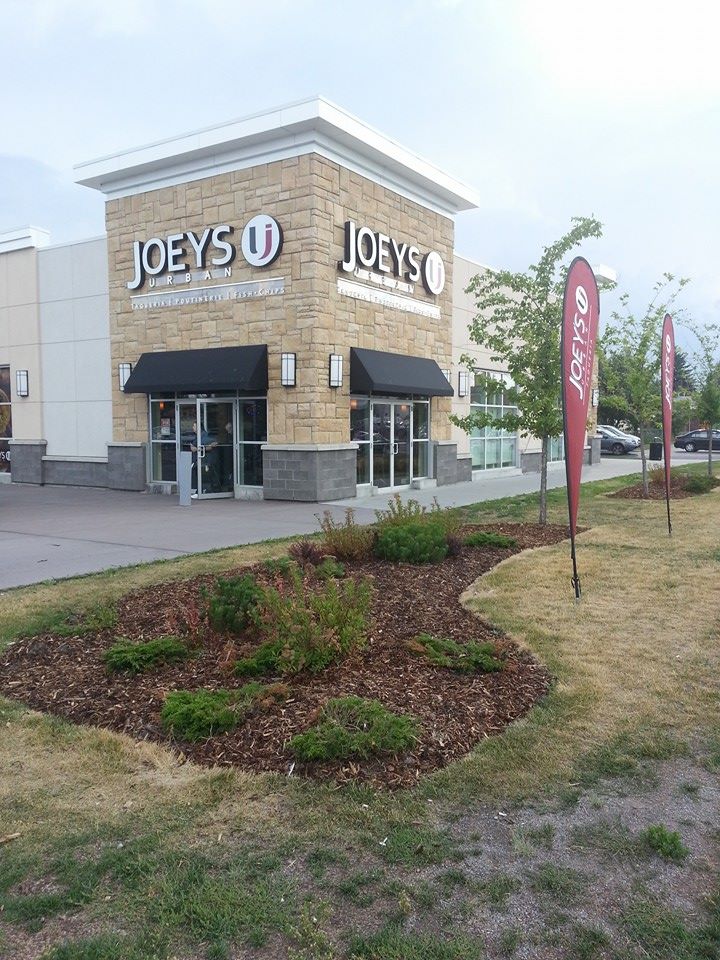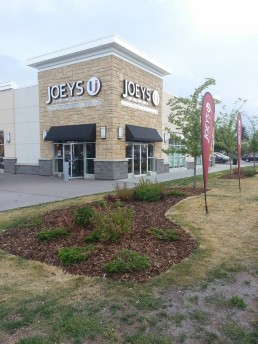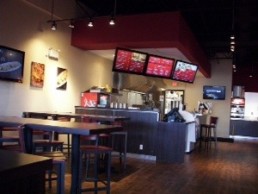Joey's Urban - International Avenue - Calgary
Grand Opening this weekend at our newest Joey’s Urban, located in Calgary on International Avenue (4501 17th Ave SE, Calgary). Come check out our 2-fer’ Promotion starting this Thursday!
13 Things to Consider when Buying a Franchise in Canada
 Great Article by;
Great Article by;
Tony Wilson
Special to The Globe and Mail
Published Tuesday, Sep. 09 2014, 5:00 AM EDT
Last updated Tuesday, Sep. 09 2014, 8:30 AM EDT
1. What’s a franchise? A franchise is essentially a licence to operate the franchisor’s business system and use its trademark according to the franchisor’s standards. The term is normally for between 5 and ten years, depending on the agreement and the lease. In exchange for the right to carry on business under the franchisor’s trademark and system, the franchisee usually pays the franchisor an initial fee for these rights (somewhere between $15,000 and $100,000), and an ongoing royalty linked to the gross sales of the franchised outlet (between 5 per cent and 8 per cent of gross sales). There’s usually a requirement for the franchisee to make regular contributions to a regional or national advertising fund as well (between 1 per cent and 4 per cent of gross sales), so that the franchisor can advertise the brand in high-cost media using the contributions of all franchisees. If it’s a bricks and mortar business, the franchisee either constructs and develops the premises itself (at its cost) or can buy the constructed premises on a ‘turnkey’ basis from the franchisor.
Franchisors are essentially selling three things: the value of a (hopefully) recognizable trademark and brand; the know-how associated with the franchisor’s business system (and the franchisor being able to teach that know-how to the franchisee); and the lower unit costs that come from the purchasing power of a large buying group
2. You’re not buying the business system, you’re renting it. You’re simply acquiring the rights to use a franchisor’s business system, trademark and ‘know-how’ for 5 or ten years, depending on the term of the franchise and any renewal rights contained in the franchise agreement. Think of it like a lease. You’re ‘renting’ the franchisor’s business system and brand for a time, and when that time is up, it’s over. Those rights revert back to the franchisor, who can sell those rights to someone else
3. Renewal and assignment rights are not automatic. Virtually all franchise agreements allow for the right to renew for at least one term, and permit the franchisee to assign the contract. But there are always conditions (and fees) that go along with the exercise of renewal and assignment rights. If you don’t meet those conditions, you wont be able to renew or assign.
4. Critically assess the FDD and all financial and other information given to you. Franchisors awarding franchises in Alberta, Ontario, Manitoba, New Brunswick and PEI are required by law to provide a FDD to prospective franchisees at least 14 days before the franchisee signs any agreement relating to the franchise or pays any money (this differs slightly depending on the province).
The FDD is required to contain all material facts relating to the franchise investment, and there are very serious legal remedies available to franchisees if the franchisor fails to comply with its disclosure obligations. Read the FDD and the documents attached to it carefully with your lawyer and financial advisor. Remember that although these documents will assist you in assessing the nature of the investment, they’re always written for the franchisor’s benefit, and will be crafted to put the franchisor and the franchise system in the best light possible, even when there are lawsuits and other problems facing the franchisor. Also appreciate that if you are in B.C., Saskatchewan, Nova Scotia, Newfoundland and Quebec, there is no legal obligation for a franchisor to provide you with its FDD, and no statutory remedies available to you in the event the franchisor fails to disclose a material fact relating to the franchise as in Ontario, Alberta and the other ‘disclosure provinces.’
5. Be careful of U.S. franchise agreements that have not been adapted to Canadian laws. Sometimes U.S.-based franchisors forget that Canada is a separate country. They don’t modify their agreements to suit Canadian laws. In particular, a U.S. franchisor may not have contemplated the effect of Canadian withholdings tax, something I’ve written about before and which could cost you additional money if not dealt with at the outset of the arrangement.
6. Don’t get sidetracked negotiating the boilerplate. Franchisors pay their lawyers lots of money to draft standard, solid and enforceable franchise agreements that they can use with all their franchisees with little or no amendments. The franchisee lawyer that sends the franchisor a 25-page list of changes to the franchisor’s agreement is arguably unfamiliar with the norms of the franchising relationship. Part of the lawyer’s job is to know what’s ‘normal’ and what’s not; what’s negotiable and what’s not.
7. If you can, avoid entering a franchise agreement where both you and your spouse have to guarantee the contract. It only means the franchisor has two of you to sue if the business fails. If at all possible, limit your exposure so that only one of you assumes all the risk. You might also consider capping any personal guarantee to a maximum amount.
8. Trademarks. Does the franchisor own or control the trademark? (The Canadian Intellectual Property Office has a search engine that allows you to check trademark applications and registrations here)
9. Pricing for products. What assurances are there that the products for sale by the franchisor can be bought by the franchisee at competitive prices? What if the products for sale have to be shipped from another part of the country, or another country? Have you factored in freight costs and duty? A 91-cent dollar can create problems for Canadian franchisees who may be required to buy products from the U.S. in U.S. dollars and pay royalties and other fees in U.S. dollars.
10. Exclusive territory. Are you getting an exclusive territory as part of the deal? Can it be lost or reduced?
11. Don’t forget to talk to other franchisees in the system. Even if they’re in other parts of the country thousands of miles away, their input is invaluable. And if they are reluctant to speak with a stranger out of the blue, ask these three questions: Are you happy? Are you making any money? Would you do it again?
12. If the franchisor is not a member of the Canadian Franchise Association (CFA), ask ‘why not?’ The CFA is the only association of franchisors and service providers in the franchise industry in Canada. It has extensive rules on ethical franchising and advises prospective franchisees to investigate before investing. If the franchisor isn’t a member, why not?
13. Don’t let your expectations get away from you. Finally, like any other investment, acquiring a franchise involves a high degree of risk. Some franchises work out very well for the franchisees. And some do not. Do not sell the concept to yourself. Be prepared to walk away.
Joey’s Franchise Group has a franchise that fits your needs and these rules. Call Rob Hilditch at 1-800-661-2123 for more details.
Tony Wilson is a franchising, licensing and intellectual property lawyer at Boughton Law Corp. in Vancouver, he is an adjunct professor at Simon Fraser University (SFU), and he is the author of two books: Manage Your Online Reputation, and Buying a Franchise in Canada. His opinions do not reflect those of the Law Society of British Columbia, SFU or any other organization.
Original Link:
http://www.theglobeandmail.com/report-on-business/small-business/sb-growth/day-to-day/thirteen-things-to-consider-before-buying-a-franchise-in-canada/article20471510/
Hospitality.....
Ultimately, hospitality is your competitive edge. Don’t confuse that with providing good service — you can give good service and still have people leave feeling un-cared for.
True hospitality doesn’t come from what you DO, it is a result of how you ARE. This creates a training dilemma. How do you help people learn to BE different? For that matter, how do YOU learn to be different?
The truth is that you don’t learn it as much as you allow it to blossom from the inside. It is a wonderfully natural — and totally painless — process of seeing life from a different direction. A Place of Hospitality is designed to help you move in that direction … and help you stay in that place once you have found it.
“To give real service you must add something which cannot be bought or measured with money, and that is sincerity and integrity.” – Donald A. Adams
It all starts with…….you!
Ambition in Franchising
What’s the story behind the franchise?
What drove the concept to become what it is?
Who is at the healm and what is that person like?
Strong, established franchise systems, have great stories behind them. They have leaders who built the system from their passion for the product and the ambition to make their dreams a reality. The key word here, is ambition. That ambition drove the franchise system in its infancy and will still be driving the franchise company today.
“Make no little plans: they have no magic to stir men’s blood.” These words were uttered by Daniel Burnham, the Chicago architect whose vision recreated the city after the great fire of 1871. The result of his ambition is an extraordinary American city that still has the magic to stir men’s blood. Ambition is sometimes seen as a negative these days, but without it we would stagnate. You need a culture that supports big steps and powerful beliefs. You can see these qualities in cities that have transformed themselves. Cities are the most visible examples of successful and failed cultures. Bilbao and Barcelona did so and became the envy of the world and prime tourist destinations. Pittsburgh reinvented itself when the steel industry withered. But Detroit wasn’t able to do the same when the auto industry took a dive.
At Joey’s Franchise Group, our leaders, have that ambition and passion. We have a great story of adversity to dig the trenches and crawl out with success. Our culture is founded on Passion, Urgency and Excellence. Our Founder, Joe Klassen and his partners, literally used their blood, sweat and tears to grow the Joey’s brand into a success. Then use that foundation to create and maintain multiple franchises and supporting companies. We have become a truly vertically integrated company allowing for success of our franchise partners at every level with every concept!
– Joey’s Restaurants,
– Joey’s Urban,
– MVP Modern Barbers,
– Homes & Land Magazine, and,
– many other support companies
Rob Hilditch, VP of Business Development
Joey’s Franchise Group

